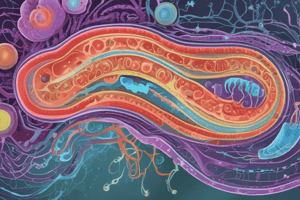Podcast
Questions and Answers
What is the primary focus of medical microbiology?
What is the primary focus of medical microbiology?
- The classification of fungi and algae
- The interaction between multicellular organisms and their environments
- The study of non-pathogenic microorganisms
- The causes of infectious diseases and the host's response (correct)
Which of the following is a misconception held by the general public regarding microorganisms?
Which of the following is a misconception held by the general public regarding microorganisms?
- Microorganisms include viruses, bacteria, and fungi
- All microorganisms can cause infections (correct)
- Microorganisms perform essential functions on Earth
- Most microorganisms are beneficial and not harmful
Which of the following is NOT considered a category of medical microbiology?
Which of the following is NOT considered a category of medical microbiology?
- Immunology
- Virology
- Microsociology (correct)
- Bacteriology
What role do bacteria play in the human body?
What role do bacteria play in the human body?
What challenge still exists despite advancements in antibiotics and vaccines?
What challenge still exists despite advancements in antibiotics and vaccines?
Flashcards
Microbiology definition
Microbiology definition
The study of microscopic organisms like bacteria, viruses, and fungi.
Microorganisms and environment
Microorganisms and environment
Microorganisms exist everywhere and are crucial parts of ecosystems and human bodies.
Beneficial microorganisms
Beneficial microorganisms
Many microorganisms help with digestion or food production without harming us.
Pathogens
Pathogens
Signup and view all the flashcards
Medical Microbiology
Medical Microbiology
Signup and view all the flashcards
Study Notes
Introduction to Microbiology
- Microbiology (Micro = small, bios = life, logos = science) is the study of microscopic organisms (like viruses, bacteria, archaea, fungi, protozoa, and algae).
- Some microscopic organisms (like certain fungi and algae) are visible to the naked eye.
- Microorganisms are found in all environments and associated with all multicellular organisms.
- Microorganisms play critical roles in the human body, like recycling in the intestines.
- Many microorganisms are vital for life on earth.
- Humans have exploited some microorganisms for products (antibiotics, food).
Microorganisms and Human Health
- Public perception often focuses on harmful microorganisms (infections, plagues).
- In reality, only a small fraction of known microbial species cause human disease.
- Pathogens are the disease-causing microbes.
- Medical microbiology integrates various fields like immunology, virology, bacteriology, mycology, parasitology.
- Focuses on the causes of infectious diseases and host reactions to pathogens.
Infectious Diseases and Modern Medicine
- The advent of antibiotics and vaccines has lessened the fear of many infectious diseases.
- New pathogens are constantly emerging and old ones may develop resistance.
- Infectious diseases like AIDS and rabies continue to pose challenges and require ongoing research.
- Microbiology is crucial for diagnosis, treatment, and prevention of infectious diseases.
Studying That Suits You
Use AI to generate personalized quizzes and flashcards to suit your learning preferences.




